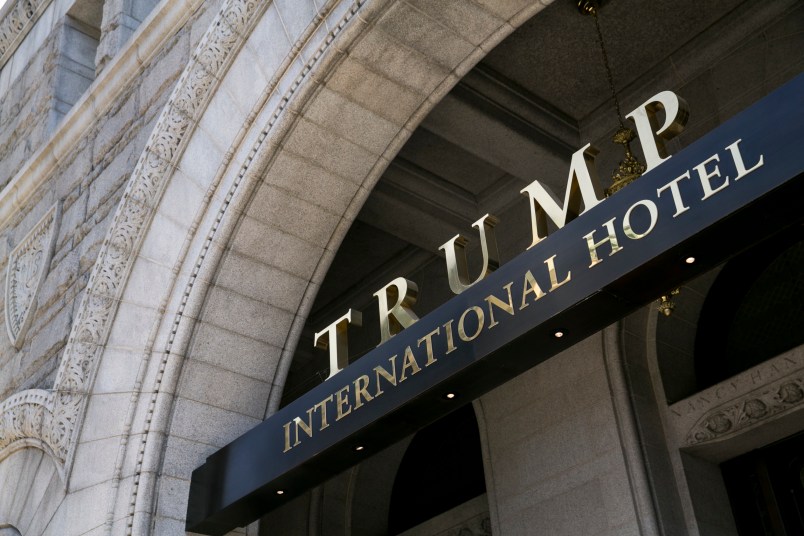The Justice Department asked a court to dismiss the lawsuit brought by a watch dog group alleging that President Trump is in violation of the Constitution’s Emolument clause. The filing from the federal government on Friday argued that neither the Citizens for Responsibility and Ethics (CREW), nor the businesses that have joined the lawsuit, have the standing to bring the legal challenge, while asserting that the Emoluments clause does not apply to the sort of profits Trump is benefiting from through his businesses while in office.
“As explained below, the Emoluments Clauses apply only to the receipt of compensation for personal services and to the receipt of honors and gifts based on official position. They do not prohibit any company in which the President has any financial interest from doing business with any foreign, federal, or state instrumentality,” the court doc said.
Soon after he took office, Trump was targeted with the lawsuit, which claimed he was in violation of a constitutional clause that bars office holders from accepting “any present, Emolument, Office, or Title, of any kind whatever, from any King, Prince, or foreign State.”
The Justice Department on Friday said that CREW’s claims of harm, in the form to the legal resources they were devoting to the issue, were “abstract” and “insufficient,” while arguing that the businesses that have joined the lawsuit should not be considered competitors to Trump’s restaurants and hotels.
The Justice Department said that the plaintiffs were misrepresenting the meaning of “emoluments” in their lawsuit.
“It would be unnatural to describe a public official’s receipt of benefits from a business venture unrelated to his office as ‘accept[ing] of [a] present,’ and nothing indicates that the Framers would have intended the Clause to be applied in that way,” the court doc said.
“Nor can the term ‘present’ naturally be read to include benefits tendered to a U.S. official by operation of law, such as foreign trademarks, licenses, permits, and approvals granted to an official’s private business, as Plaintiffs allege,” the filing added.
The Justice Department pointed to the business ventures that past presidents dating back to George Washington, as well as other Cabinet officials, were involved in.
“Had the Framers intended the Emoluments Clauses to encompass benefits arising from a federal official’s private commercial transactions with a foreign state, or in case of a President, with a foreign, federal, or state instrumentality, surely someone would have raised concerns about whether foreign governments or government-owned corporations may have been among the customers of the farm and other products regularly exported by early Presidents,” the court doc said. “Yet, there is no evidence of these Presidents taking any steps to ensure that they were not transacting business with a foreign or domestic government instrumentality.”
Read the full filing below:







And yet, Jimmy Carter bemoaned the fact that they made him sell his peanut farm. Times have certainly changed.
There isn’t even ONE Republican with enough morals to fill a thimble. For Jesus, of course.
Not in the least. Carter is a Democrat. Trump is a Republican. See the difference?
And if our next President is a Democrat, he will be prosecuted if he sells a baseball cap for a $10 profit.
Or if she’s connected with an A-rated charity from which she never received a dime. Obviously a slush fund. Or pay to play. Or something.